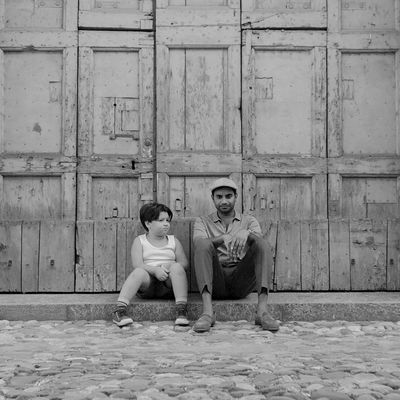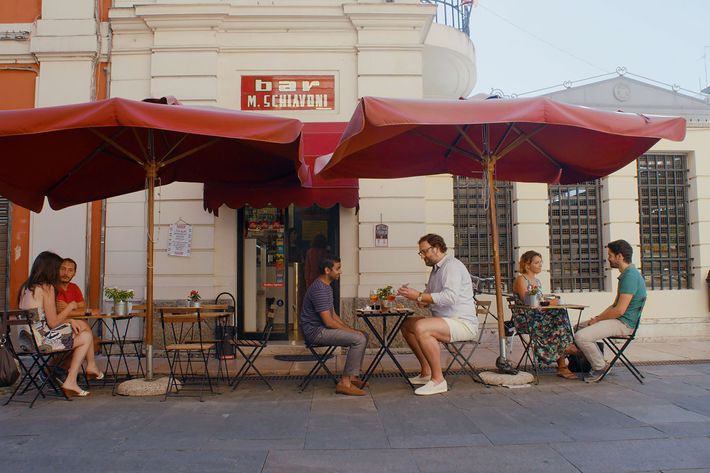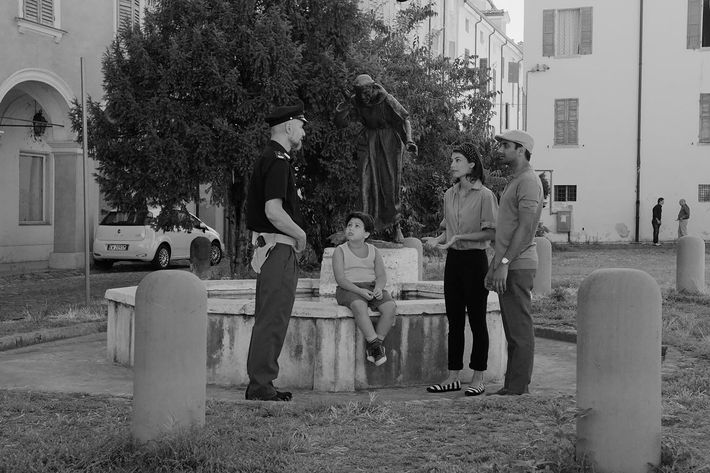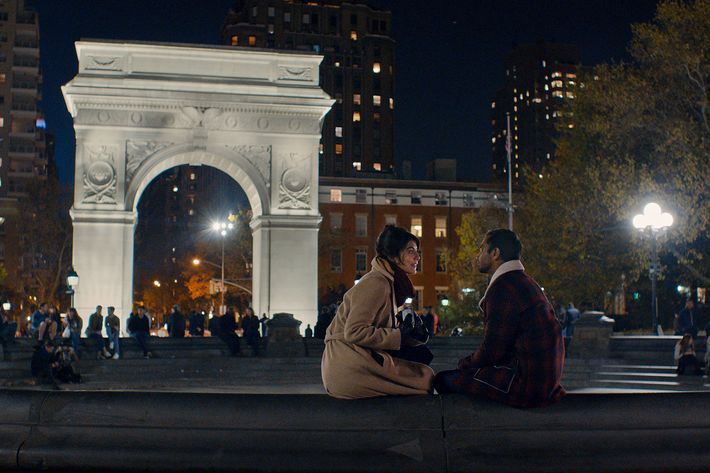
Spoilers ahead for Master of None season two.
In the first episode of Master of None’s second season, Dev Shah wakes up in the quaint Italian town where he’s learning the art of making pasta. At his bedside is a stack of movies from the Criterion Collection, representing some of the classics of Italian art cinema: three by director Michelangelo Antonioni and three by Federico Fellini, plus Vittorio De Sica’s Bicycle Thieves. That last film ends up being a direct inspiration for the episode that follows, which borrows heavily from both the story and style of De Sica’s masterpiece.
As they did with season one of Netflix’s award-winning sitcom, series co-creators Aziz Ansari and Alan Yang use season two to follow the ever-bending arc of Dev’s love life and career prospects. This year, the aspiring actor and son of Indian immigrants gets a well-paying, somewhat embarrassing gig as the host of a reality competition show called Clash of the Cupcakes, he dates women he doesn’t click with, and pines for an already-engaged Italian named Francesca (Alessandra Mastronardi). Along the way, Ansari and Yang also drop in one-off episodes that explore family, sexuality, religion, labor, and life in New York City.
Throughout the season, Master of None keeps referencing old Italian movies, while nodding to other films and filmmakers that lie in the same artful, sincere, romantic mode as Ansari and Yang. In some of these cases, Master of None may have inadvertently shadowed the greats; at other times, they’re paying obvious homage. Either way, the glossary below identifies the cinema that influenced this season — nearly all of which fans of Master of None should investigate if they haven’t before.
Allen, Woody
It’s almost impossible for any film geek to tell a New York–set story about romance, career, and culture without aping Woody Allen. Ansari and Yang actually take from the prolific director several times this season. Start with their casting of Mastronardi, who plays a desirable-but-taken character not unlike the one she played in 2012’s To Rome With Love. Francesca’s feelings for Dev also grow over the course of a couple trips to museums, recalling the “walk and talk” courtship between Allen’s Isaac and Diane Keaton’s Mary in Manhattan. “First Date,” the season’s third episode, is essentially one long montage of Dev trying to connect with somebody new on the dating scene, which is reminiscent of Alvy Singer’s failed attempts to replace his ex-girlfriend in Annie Hall. Even the whole idea of paying tribute to great Italian filmmakers through imitation has been done by Woody — most notably in Stardust Memories, his spin on Federico Fellini’s 8½.
Argento, Dario
Ansari memorably borrows from the Italians during one brief, dark fantasy sequence. Late in the season, Dev imagines Francesca rejecting his romantic advances and then literally ripping his heart out of his chest (which could also be an Indiana Jones and the Temple of Doom reference) and tossing it into a woodchipper (which could be a nod to Fargo). The most striking image in the sequence comes when Dev falls to the floor of his apartment, and a pool of vividly red blood fills the ground beneath his body — like something out of Italian suspense master Dario Argento’s gory “giallo” classics Deep Red and Suspiria.

L’Avventura (1960) / La Notte (1961)
Of all the filmmakers who influenced this Master of None season, the one who casts the longest shadow is Michelangelo Antonioni, who inspired two of the ten episodes. The first is “Le Nozze,” a sideways adaptation of Antonioni’s La Notte which has Dev’s buddy Arnold visiting him in Italy. The two attend a lavish party, where — like in Antonioni’s movie — Arnold comes to grips with the end of a relationship. The episode also features a scene where a summer shower sends giddy guests leaping into a swimming pool, as in La Notte. And in the season’s longest episode, “Amarsi Un Po,” Dev and Francesca watch Antonioni’s L’Avventura together on a snowy New York night, and find themselves falling into the pattern of the characters in that film, sharing a mutual attraction complicated by an absent fiancé.
“Bacon and God’s Wrath” (2015)
The provocatively titled episode “Religion” is partly about Dev trying to hide his lack of interest in Islam from his more devout parents, but it’s mostly about how he and his cousin Navid skip a holiday prayer service to gorge on forbidden pig at a barbecue festival. Navid’s initiation by Dev into the wonders of bacon is a lot like this charming Sol Friedman short film, about a 90-year-old Jewish woman who has a crisis of faith and decides it’s probably time to take her first bites of pork.

Bicycle Thieves (1948)
Even more than Master of None’s two Antonioni-inspired episodes, the season’s most blatant homage comes in the premiere, “The Thief,” which riffs on the plot, credit fonts, and black-and-white cinematography of Vittorio De Sica’s Bicycle Thieves. Rather than a poor working man losing a bike he needs to get a job, this episode is about the relatively well-off Dev losing a cell phone — and with it, the phone number of an attractive young woman named Sara. The heroes of both stories fall into a despair that pushes them to take the item from someone else that was previously swiped from them. Ansari (who co-wrote the script and directed the episode) even saddles Dev with a young Italian boy as a companion, so that he can copy some of Bicycle Thieves’ shots of a sad-sack father and son.
Big Night (1996)
There are a lot of great “food movies” — such as Tampopo, Babette’s Feast, and Eat Drink Man Woman — and yet despite this season’s fascination with both classic cinema and gastronomy, Ansari and Yang don’t specifically quote from any one of them. The closest they get is in the scenes where Dev lovingly makes (and eats) pasta, which call to mind the way Big Night’s main characters prepared elaborate Italian dishes with the care of fine craftsmen.
Captain America: The Winter Soldier (2014)
The most successful of the many dates in “First Date” is with a woman named Priya (played by The Good Place’s Tiya Sircar), which goes well not because she and Dev end up sleeping together, but because they have the easiest rapport. They make each other laugh, like when Dev imagines her having a mechanical arm “like the Winter Solder” — in response to which she gently mocks him for knowing so much about the Marvel Cinematic Universe. One episode later, the two have an awkward dinner together, and their relationship dies in its “budding” stage. In retrospect though, they might’ve been in trouble as soon as he started talking about Captain America, revealing that he’s an arrested adolescent in a lot of ways.
Dead Presidents (1995)
Season two’s best episode is “Thanksgiving,” which follows Dev and his lesbian friend Denise through year after year of holidays with her family, as she tries to get her mother Catherine (beautifully played by Angela Bassett) to accept her attraction to women. It’s an inventive and moving half hour, ending with a pointed reimagining of Norman Rockwell’s Freedom From Want painting. It’s also the episode peppered with the most references to popular culture, as a way of marking the passage of time. The funniest of these comes when Catherine walks into Denise’s room with a beauty mask on, and a startled Dev jokes that she looks like one of the painted-faced bank robbers in the Hughes brothers’ cult-favorite crime film Dead Presidents.
La Dolce Vita (1960)
Dev’s Criterion stack includes 8½ and Amarcord, but the Fellini film this Master of None season copies from the most is La Dolce Vita, the director’s influential international smash hit about a soul-sick journalist. Both the movie and the show feature scenes set on helicopters that fly around a city, and both are anchored by a hero who lives a “sweet life” on the fringes of fame and fortune while deriving very little satisfaction from it.
Free Zone (2005)
At the end of “The Dinner Party” — the season’s pivotal fifth episode — a visiting Francesca has to go back to Italy. After Dev says good-bye to her, he rides alone in the back of a car for a long time, quietly mourning his situation. The scene plays out in a single take, lasting minutes, with an unmoving camera fixed completely on Dev as the emotion wells up and incongruously poppy music plays on the radio. This mirrors the opening shot of Amos Gitai’s Israeli drama Free Zone, which starts with a woman played by Natalie Portman sobbing to herself in a moving vehicle, viewed in a lengthy, unbroken close-up.
French New Wave
The Italians aren’t the only Europeans who get a wink from Master of None. From Dev and Francesca’s impromptu “pajama dance parties” to the complicated love triangles and romantic pining, this season shares a sensibility with the early films of French filmmakers like François Truffaut, Jean-Luc Godard, and Jacques Demy. These season two episodes are exuberantly youthful, and seem to take a perverse pleasure in examining thwarted love affairs.
Goodfellas (1990)
Twice in this season, Dev winds his way through a restaurant while a camera tracks behind him, in scenes that play like shortened versions of Goodfella’s famous single-take trip through the Copacabana. Is the homage intentional or unconscious? It may be hard to tell, since cinephiles like Ansari and Yang — and Wareheim, who directed one of those scenes — came of age in a film culture where Goodfellas’ flashy visuals have become ubiquitous. (Nevertheless, it is highly likely that they’ve watched Scorsese’s documentary My Voyage to Italy, about his lifelong love of Italian cinema.)
Lee, Spike
One of the key scenes of “Thanksgiving” sees Denise dating a vapid woman who talks through the climactic riot in Spike Lee’s Do the Right Thing — the most obvious indication that she’s not the gal for Dev’s buddy. That same episode has Denise in a Malcolm X hat. Also, a lot of the scenes in her family’s kitchen are reminiscent of Lee’s semi-autobiographical Crooklyn, in the way they have multiple generations bickering and laughing with each other.

Linklater, Richard
Given how many Master of None episodes feature prospective lovers falling for each other while walking through the city streets and talking, it’s clear that Ansari and Yang are big fans of Richard Linklater’s Before Sunrise/Sunset/Midnight trilogy, which is all about the romantic power of long conversations in beautiful locations. (Not to mention the narrative power of ambiguous endings.) But the more specific Linklater connection comes in “New York, I Love You,” which connects its three stories by having characters overlap and effectively pass the narrative baton, just like in the writer-director’s seminal indie film, Slacker.
The Mask (1994)
Dev jokes at one point that when he was a kid, his parents said they were going to take him to mosque and he thought they said “The Mask,” the Jim Carrey movie. That’s a comment on the character’s lack of religious faith, but like this season’s many casual references to Problem Child 2 and other ’90s movies and TV, it’s also a reminder that Dev and his friends were raised on pop junk food.
Metti, una sera a cena (1969)
This year’s soundtrack is littered with hip-hop, art-rock, and old Top 40, but in a nod to the season’s dominant motif, it also features a lot of Eurodisco, Italian pop, and movie soundtrack music. “The Thief” even includes a track by cinema-scoring legend Ennio Morricone: “Alla luce del giorno,” a lounge-y tune from the sexy melodrama Metti, una sera a cena. The film itself probably wasn’t much of an influence on Ansari and Yang, though like the show, the movie’s plot does follow a circle of attractive young professionals who lust after each other, even as some of them are already attached to other people.
Neorealism
Master of None’s Italian fetish leans more toward highbrow cosmopolitans like Antonioni and Fellini, but the season also nods to the earthier Roberto Rossellini and De Sica, taking a key trait from them and other Neorealist directors in the use of nonprofessional actors. Like the first season, the second has Anzari’s own parents playing Dev’s folks. A lot of the rest of the cast is filled out by new faces, along with Anzari and Yang’s comedian pals. Their lack of polish brings a different comic rhythm, at times coming off as endearingly clunky.
New York Stories (1989)
One of season two’s more experimental episodes is “New York, I Love You,” which tells three short stories from the perspective of a doorman, a convenience store clerk, and an immigrant cab driver. Omnibus films — including ones set in NYC — aren’t that unusual, but this particular triptych is especially reminiscent of New York Stories, in which Martin Scorsese, Francis Ford Coppola, and Woody Allen put their auteur stamp on three tales set in their shared hometown. The difference is that those filmmakers cover privileged citizens — a famous painter, an heiress, and a lawyer — while Ansari, Yang, and their co-writer Cord Jefferson focus on the kind of New Yorkers who serve the rich.
Summertime (1955) / Under the Tuscan Sun (2003)
In “The Thief,” Sara compares Dev’s Italian adventure to the jilted wife Diane Lane plays in Audrey Wells’s adaptation of Frances Mayes’s best-selling memoir Under the Tuscan Sun. (He’s never seen that movie, though when he hears Sara recount the plot, Dev remembers that the actress played an adulterer in Unfaithful and jokes, “What goes around comes around, Diane Lane!”) Of course, Under the Tuscan Sun is far from the only movie where a single person rediscovers a passion for life and romance during an extended stay in Italy. The classic example here would be the Oscar-nominated Summertime, where Katherine Hepburn plays a Middle American spinster who has a fling with a married man in Venice.
Vanishing of the Bees (2009)
During Dev’s dinner with Sara, the two of them bond over her casual mention of a documentary about bees, which he remembers was narrated by Ellen Page. Vanishing of the Bees is the film they’re talking about (which was actually narrated by Emilia Fox in its U.K. release, though perhaps the British Sara saw it when she was in the United States). The doc is a chilling look at Colony Collapse Disorder — exactly the kind of movie that that two socially conscious young adults like these two would have in common.
Wong Kar-wai
Dev and Francesca’s frustrated romance has echoes of multiple films by contemporary Hong Kong art filmmaker Wong Kar-wai. The season finale “Buona Notte” especially recalls 2000’s In the Mood for Love, where would-be lovers express their feelings for each other through gestures and furtive touches instead of full-on physical contact. The colored lighting in Dev’s apartment — and the way he and Francesca “kiss” each other by pressing their lips against opposite sides of a pane of glass — is right out of the Wong playbook.

